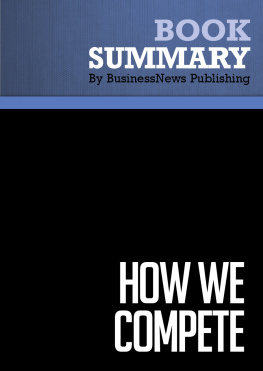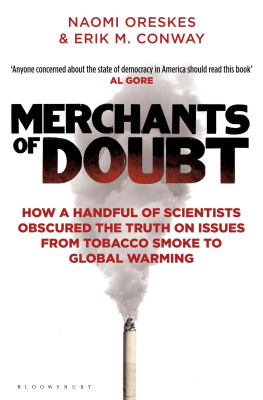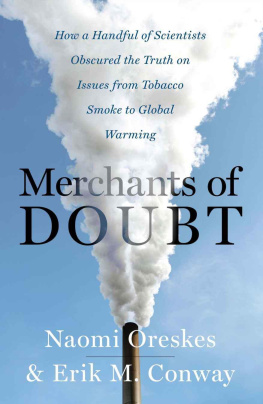BusinessNews Publishing - Summary: Merchants of Doubt: Review and Analysis of Naomi Oreskes and Erik Conways Book
Here you can read online BusinessNews Publishing - Summary: Merchants of Doubt: Review and Analysis of Naomi Oreskes and Erik Conways Book full text of the book (entire story) in english for free. Download pdf and epub, get meaning, cover and reviews about this ebook. year: 2017, publisher: Political Book Summaries, genre: Politics. Description of the work, (preface) as well as reviews are available. Best literature library LitArk.com created for fans of good reading and offers a wide selection of genres:
Romance novel
Science fiction
Adventure
Detective
Science
History
Home and family
Prose
Art
Politics
Computer
Non-fiction
Religion
Business
Children
Humor
Choose a favorite category and find really read worthwhile books. Enjoy immersion in the world of imagination, feel the emotions of the characters or learn something new for yourself, make an fascinating discovery.

- Book:Summary: Merchants of Doubt: Review and Analysis of Naomi Oreskes and Erik Conways Book
- Author:
- Publisher:Political Book Summaries
- Genre:
- Year:2017
- Rating:5 / 5
- Favourites:Add to favourites
- Your mark:
- 100
- 1
- 2
- 3
- 4
- 5
Summary: Merchants of Doubt: Review and Analysis of Naomi Oreskes and Erik Conways Book: summary, description and annotation
We offer to read an annotation, description, summary or preface (depends on what the author of the book "Summary: Merchants of Doubt: Review and Analysis of Naomi Oreskes and Erik Conways Book" wrote himself). If you haven't found the necessary information about the book — write in the comments, we will try to find it.
BusinessNews Publishing: author's other books
Who wrote Summary: Merchants of Doubt: Review and Analysis of Naomi Oreskes and Erik Conways Book? Find out the surname, the name of the author of the book and a list of all author's works by series.
Summary: Merchants of Doubt: Review and Analysis of Naomi Oreskes and Erik Conways Book — read online for free the complete book (whole text) full work
Below is the text of the book, divided by pages. System saving the place of the last page read, allows you to conveniently read the book "Summary: Merchants of Doubt: Review and Analysis of Naomi Oreskes and Erik Conways Book" online for free, without having to search again every time where you left off. Put a bookmark, and you can go to the page where you finished reading at any time.
Font size:
Interval:
Bookmark:

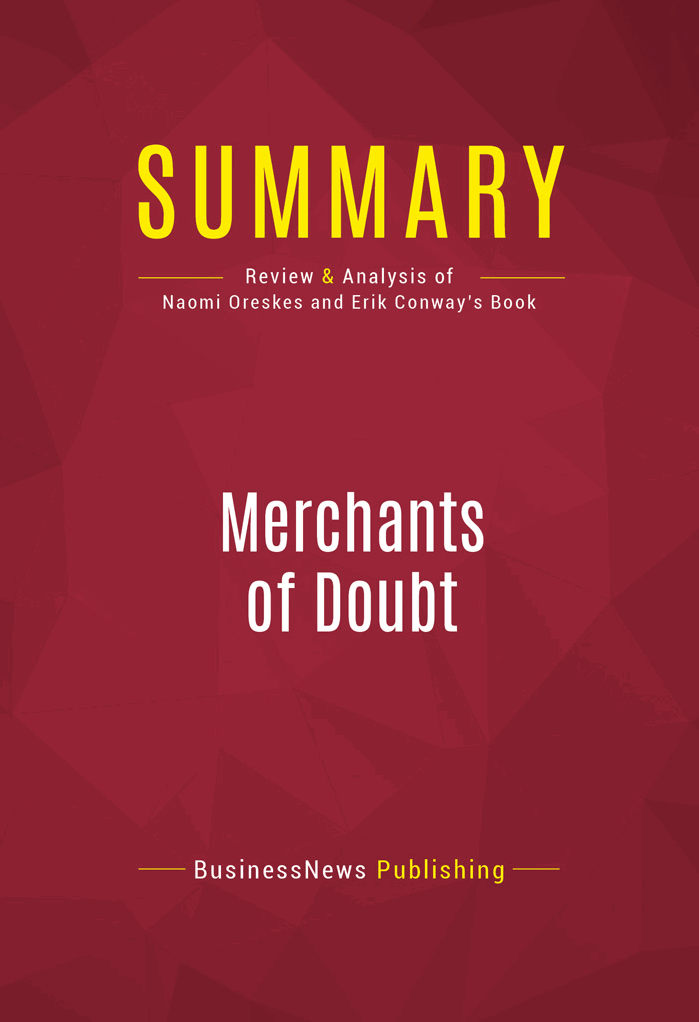
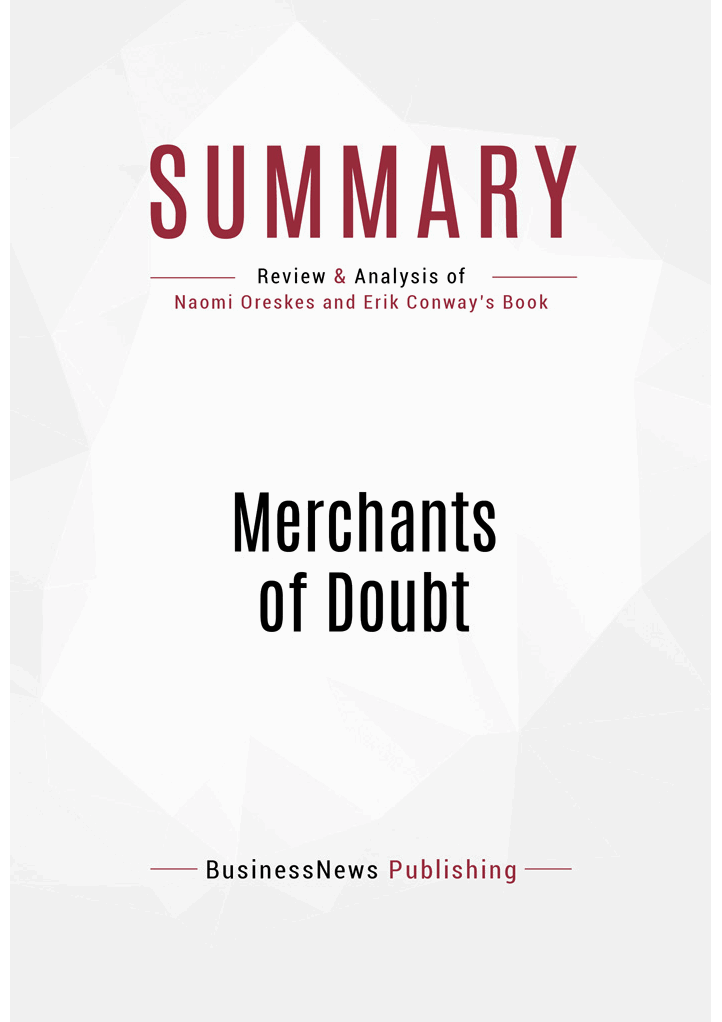
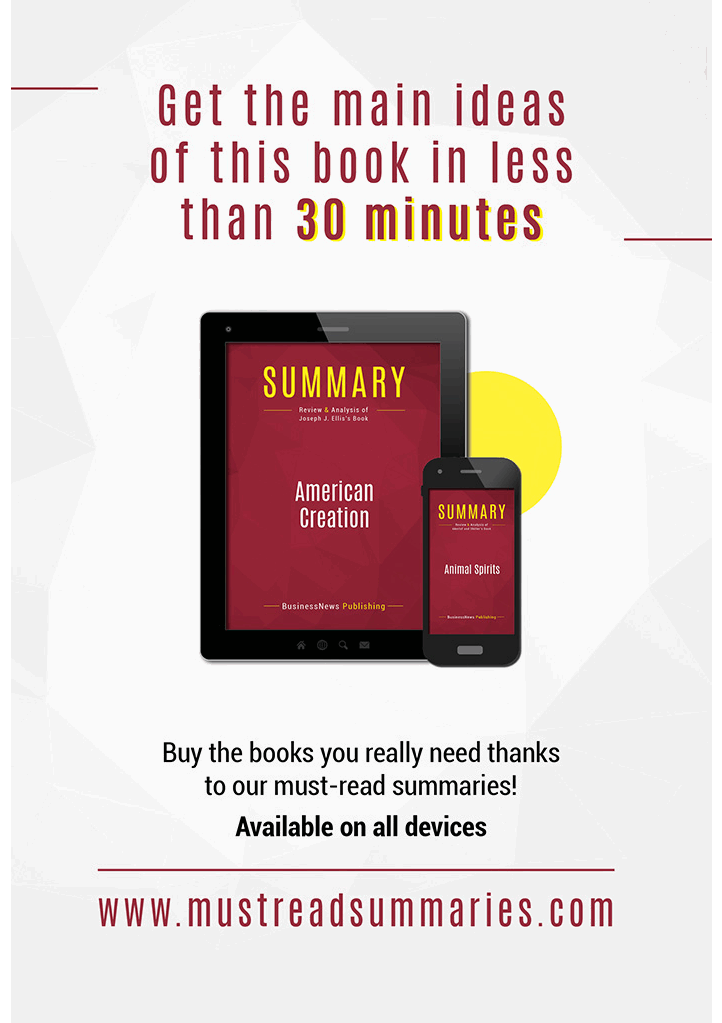
Science can rarely ever draw definitive conclusions early on but usually must wait until empirical proof emerges before theories can be validated. A handful of politically conservative scientists (with strong and often undisclosed ties to particular industries) have used this characteristic of the scientific method to their advantage to challenge the scientific communitys emerging consensus on various issues including the health dangers of cigarette smoking, the effects and source of acid rain, the existence of the ozone hole and in more recent times the impact of mans activities in generating climate change.
Whats interesting about this phenomena is the same group of three scientists physicists Bill Nierenberg, Fred Seitz and Fred Singer keep popping up again and again whenever science is attempting to form a consensus view on controversial political issues like global warming. It appears their standard modus operandi is to use the scientific communitys insistence on gathering definitive empirical data first as an opening to generate deliberate obfuscation about these issues, thereby influencing both public opinion and the political will of policy makers. In other words, todays climate change skeptics are in fact recycled critics of controls on tobacco and acid rain who use their scientific credentials to present themselves as authorities and then attempt to steer the public debate to try and discredit any science they dont like.
The best way to respond to their attempts to discredit science, disseminate false information, spread confusion and create doubt is to be aware of whats going on.
Naomi Oreskes and Erik Conway are science historians. Naomi Oreskes is Professor of History at the University of California, San Diego. Erik Conway is the historian at NASAs Jet Propulsion Laboratory at the Californian Institute of Technology in Pasadena.
The six most high profile scientific issues which have dominated public policy debates and also politics in the late twentieth and early twenty-first centuries have been:
- The Link Between Tobacco and Cancer whether or not this could be scientifically established
- Star Wars the space-based Strategic Defense Initiative and the science of nuclear winters
- Acid Rain sulphur and nitrogen emissions mixing with rain to become highly corrosive
- The Ozone Hole the idea that human activities were reducing the Earths protective ozone layer
- The Effects of Secondhand Smoke whether it caused cancer in otherwise healthy nonsmokers
- Global Warming whether it is being caused by CO2emissions released by burning fossil fuels
As diverse as these topics may sound at first glance, every time they have been discussed in public forums, there has been a small band of scientists who have been hard at work behind the scenes throwing doubt on the work of the scientific community. The backroom operatives who have played a disproportionately large roles in public debates about all six of these issues are:
- Bill Neirenberg a physicist who worked on the Manhattan Project which developed the atomic bomb during World War II. He was at one time a director of the Scripps Institution of Oceanography and served as a member of Ronald Reagans transition team where he nominated scientists who should serve in important positions in the incoming Reagan administration. He was a co-founder of the George C. Marshall Institute in 1984 and served for many years as a consultant to the National Security Agency of the United States. He also served asa consultant to the White House Office of Science and Technology and asa member of the NASA Advisory Council from 1978 until 1982.
- Fred Seitz a solid-state physicist who also helped develop the atomic bomb. He is a former president of the U.S. National Academy of Sciences. Fred Seitz and Fred Singer have collaborated together to oppose many forms of state intervention and regulation of U.S. citizens. Seitz and Singer formed the Heritage Foundation, the Competitive Enterprise Institute and the Marshall Institute to carry out their battles against what they considered to be bad science. Fred Seitz had a very distinguished career: he served as a science advisor to NATO in the 1950s, as president of the National Academy of the Sciences in the 1960s and as president of Rockefeller University (Americas leading biomedical research institution) in the 1970s. Seitz was ardently and passionately anti-communist and viewed the scientific community as being sometimes fickle and even irrational. At the same time, he also belived technology is continuously devising procedures to protect our health and safety and the natural beauty and resources of our world. Seitz also believed it would be possible to achieve American political superiority through superior weaponry and a strong military. Fred Seitz passed away in 2008 at age 96.
- Fred Singer an Austrian-born physicist and a genuine rocket scientist. Fred Singer was a leading figure in the development of Earth observation satellites and served as the first director of the National Weather Satellite Service. He also served as chief scientist at the Department of Transportation during the Reagan administration. Dr. Singer is emeritus professor of environmental science at the University of Virginia and has been an outspoken critic of the mainstream assessment of global warming. In 1990, he formed the Science & Environmental Policy Project to advocate the fact there is no evidence that global warming is attributable to human-caused increases in atmospheric carbon dioxide, and that humanity would benefit if temperatures do rise.
The way these three scientists have acted to try and throw doubt on the science underpinning public debate on all of the Big Six issues has followed the same pattern which they originally used to discredit scientific research which linked tobacco to cancer. Their basic modus operandi or Tobacco Strategy is:
- Use scientists with guidance from industry lawyers and public relations experts to target the research and findings of other scientists and undermine their findings.
- Put into the public domain alternative scientific explanations for what was being observed. (For example, acid rain could be caused by volcanoes rather than mans activities or global warming is just part of natural cyclic variations in the suns activities.) The existence of other alternative explanations would then cause the general perception the scientific community was still trying to establish exact cause-and-effect relationships for what was being observed.
- Make full use of the fact those who were expressing doubts over the science involved were well-known and highly respected in Washington D.C. and therefore should be taken seriously rather than dismissed as part of the scientific communitys lunatic fringe.
- Use the mass media to create the perception there are two sides to every scientific debate and that the findings of the research program are still being actively debated by the scientists involved rather than accepted as fact by all and sundry.
Font size:
Interval:
Bookmark:
Similar books «Summary: Merchants of Doubt: Review and Analysis of Naomi Oreskes and Erik Conways Book»
Look at similar books to Summary: Merchants of Doubt: Review and Analysis of Naomi Oreskes and Erik Conways Book. We have selected literature similar in name and meaning in the hope of providing readers with more options to find new, interesting, not yet read works.
Discussion, reviews of the book Summary: Merchants of Doubt: Review and Analysis of Naomi Oreskes and Erik Conways Book and just readers' own opinions. Leave your comments, write what you think about the work, its meaning or the main characters. Specify what exactly you liked and what you didn't like, and why you think so.

